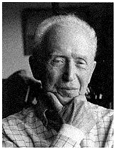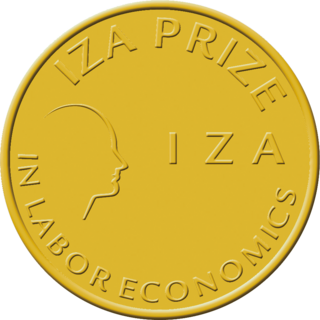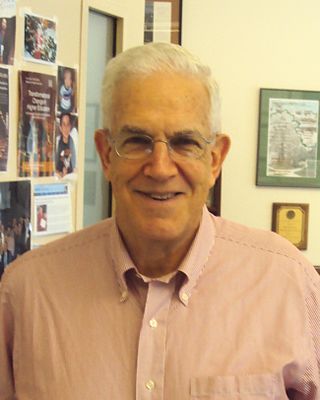
James Joseph Heckman is an American economist and Nobel laureate who serves as the Henry Schultz Distinguished Service Professor in Economics at the University of Chicago, where he is also a professor at the College, a professor at the Harris School of Public Policy, Director of the Center for the Economics of Human Development (CEHD), and Co-Director of Human Capital and Economic Opportunity (HCEO) Global Working Group. He is also a professor of law at the Law School, a senior research fellow at the American Bar Foundation, and a research associate at the NBER. He received the John Bates Clark Medal in 1983, and the Nobel Memorial Prize in Economic Sciences in 2000, which he shared with Daniel McFadden. He is known principally for his pioneering work in econometrics and microeconomics.

Jacob Mincer, was a father of modern labor economics. He was Joseph L. Buttenwieser Professor of Economics and Social Relations at Columbia University for most of his active life.

David Edward Card is a Canadian-American labour economist and the Class of 1950 Professor of Economics at the University of California, Berkeley, where he has been since 1997. He was awarded half of the 2021 Nobel Memorial Prize in Economic Sciences "for his empirical contributions to labour economics", with Joshua Angrist and Guido Imbens jointly awarded the other half.

Alan Bennett Krueger was an American economist who was the James Madison Professor of Political Economy at Princeton University and Research Associate at the National Bureau of Economic Research. He served as Assistant Secretary of the Treasury for Economic Policy, nominated by President Barack Obama, from May 2009 to October 2010, when he returned to Princeton. He was nominated in 2011 by Obama as chair of the White House Council of Economic Advisers, and served in that office from November 2011 to August 2013.

Sir Richard William Blundell CBE FBA is a British economist and econometrician.
Richard Emeric Quandt is a Guggenheim Fellowship-winning economist who analyzed the results of the Judgment of Paris wine tasting event with Orley Ashenfelter.
Konstantinos "Costas" Meghir is a Greek-British economist. He studied at the University of Manchester where he graduated with a Ph.D. in 1985, following an MA in economics in 1980 and a BA in Economics and Econometrics in 1979. In 1997 he was awarded the Bodosakis foundation prize and in 2000 he was awarded the “Ragnar Frisch Medal” for his article “Estimating Labour Supply Responses using Tax Reforms”.

Jan Švejnar is a United States-based, Czech-born economist. He was a candidate for the 2008 election of the President of the Czech Republic.

The Center for Economic Research and Graduate Education – Economics Institute, known as CERGE-EI is an academic institution in Prague, Czech Republic, specialised in economics. The institute is a partnership between the Center for Economic Research and Graduate Education of Charles University and the Economics Institute of the Czech Academy of Sciences. It is also a New York State Education Department entity with a permanent charter for its degree-granting educational programs awarded by the New York State Board of Regents. It is located in the Schebek Palace in the center of Prague.
Daniel Selim Hamermesh is a U.S. economist, and Sue Killam Professor in the Foundations of Economics Emeritus at the University of Texas at Austin, Research Associate at the National Bureau of Economic Research, and Research Fellow at the Institute for the Study of Labor (IZA). Previously professor of economics at Royal Holloway, University of London and Michigan State University. He was formerly a Distinguished Scholar at Barnard College.

The Institute for the Study of Labor awards a prize each year for outstanding academic achievement in the field of labor economics. The IZA Prize in Labor Economics has become a highly prestigious science award in international economics, is the only international science prize awarded exclusively to labor economists and is considered the most important award in labor economics worldwide. The prize was established in 2002 and is awarded annually through a nomination process and decided upon by the IZA Prize Committee, which consists of internationally renowned labor economists. As a part of the prize, all IZA Prize Laureates contribute a volume as an overview of their most significant findings to the IZA Prize in Labor Economics Series published by Oxford University Press.

Jan Kmenta was a Czech-American economist. He was the Professor Emeritus of Economics and Statistics at the University of Michigan and Visiting Professor at CERGE-EI in Prague, until summer 2016.

Ronald Gordon Ehrenberg is an American economist. He has primarily worked in the field of labor economics including the economics of higher education. Currently, he is Irving M. Ives Professor of Industrial and Labor Relations and Economics at Cornell University. He is also the founder-director of the Cornell Higher Education Research Institute (CHERI).

Francine Dee Blau is an American economist and professor of economics as well as Industrial and Labor Relations at Cornell University. In 2010, Blau was the first woman to receive the IZA Prize in Labor Economics for her "seminal contributions to the economic analysis of labor market inequality." She was awarded the 2017 Jacob Mincer Award by the Society of Labor Economists in recognition of lifetime of contributions to the field of labor economics.
Randall Keith Filer is an American economist. Dr. Filer is a professor of economics at Hunter College and the Graduate Center of the City University of New York and a Visiting Professor of Economics and Senior Scholar at CERGE-EI. He is President of the CERGE-EI Foundation, a US-based nonprofit that supports economic education in the post-communist countries of Central and Eastern Europe. Professor Filer serves as the Eastern European Coordinator of the Global Development Network (GDN), and is a member of the International Faculty Committee at the International School of Economics in Tbilisi (ISET) in Tbilisi, Georgia. He is a research Fellow of the Institute for the Study of Labor (IZA) in Bonn, CESifo (Munich), the William Davidson Institute and the Manhattan Institute (NYC).
The Judgment of Princeton was a wine tasting event held on 8 June 2012 during a conference of the American Association of Wine Economists held at Princeton University in Princeton, New Jersey. The purpose of this event was to compare, by a blind tasting, of several French wines against wines produced in New Jersey in order to gauge the quality and development of the New Jersey wine industry. Because New Jersey's wine industry is relatively young and small, it has received little attention in the world wine market. The state's wine production has experienced growth in recent years largely as a result of state legislators offering new opportunities for winery licensing and repealing Prohibition-era laws that have constrained the industry's development in past years. This event was modeled after a 1976 blind tasting event dubbed the "Judgment of Paris" in which French wines were compared to several wines produced in California when that state's wine industry was similarly young and developing. The New Jersey wine industry heralded the results and asserted that the rating of New Jersey wines by the blind tasting's judges was a victory for the state's wine industry.
Research in Labor Economics (RLE) is a biannual series that publishes peer-reviewed research applying economic theory and econometrics to analyze policy issues. Typical themes of each volume include labor supply, work effort, schooling, on-the-job training, earnings distribution, discrimination, migration, and the effects of government policies. Research in Labor Economics is published by Emerald Group Publishing in conjunction with the IZA Institute of Labor Economics (IZA).
Henry Stuart Farber is an American economist and the Hughes-Rogers Professor of Economics at Princeton University. His research revolves around different topics related to labor economics, econometrics, law and economics, and industrial relations.
Robert John LaLonde (1958–2018) was an American economist who specialized in the fields of labor economics and econometrics. He grew up in Syracuse, NY and attended Westhill High School. He received his A.B. degree from the University of Chicago in 1980. He then attended Princeton University, where he received his Ph.D. in 1985 under the supervision of Orley Ashenfelter. His own Ph.D. students included Brian Jacob. He joined the faculty of the University of Chicago in 1985 as Associate Professor of Industrial Relations at the Graduate School of Business and was a Visiting Associate Professor of The Harris Graduate School of Public Policy Studies from 1994-1995. In 1995, LaLonde joined Michigan State University as an Associate Professor of Economics for three years. In 1999, he went on to spend the remainder of his professional career at the University of Chicago, where he was professor and director of the Ph.D. program in the Harris School of Public Policy. In addition to his academic appointments, he was a research fellow at the National Bureau of Economic Research in 1986, and was a senior staff economist at the Council of Economic Advisers from 1987 to 1988. He joined the IZA Institute of Labor Economics as a research fellow in 2001. He was honored with a conference held by the Federal Reserve Bank of Chicago in 2018. He died on January 17, 2018, after a long illness.
The 2021 Nobel Memorial Prize in Economic Sciences was divided one half awarded to the American-Canadian David Card "for his empirical contributions to labour economics", the other half jointly to Israeli-American Joshua Angrist and Dutch-American Guido W. Imbens "for their methodological contributions to the analysis of causal relationships." The Nobel Committee stated their reason behind the decision, saying:
"This year's Laureates – David Card, Joshua Angrist and Guido Imbens – have shown that natural experiments can be used to answer central questions for society, such as how minimum wages and immigration affect the labour market. They have also clarified exactly which conclusions about cause and effect can be drawn using this research approach. Together, they have revolutionised empirical research in the economic sciences."











